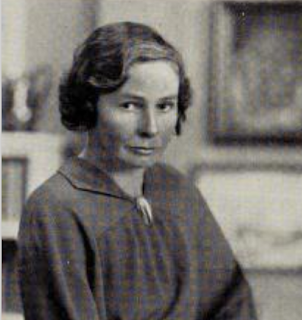Raised in Cambridge until she was 16, Margaret Postgate recalls the loveliness of spring in the university town: “you cannot be brought up within a mile of the Backs and the Bridges, seeing the weeping willows year by year coming into leaf and the spring flowers waking in St. John’s Wilderness, or be taken, even occasionally, to King’s Chapel when the morning sun is shining through the clear reds and blues of the east window, or even walk to school along the gracious curve of Trumpington Street, without some sense of beauty seeping into you.”*
But then in 1914, the unthinkable happened, and it changed the world forever.
Spring Song, 1917
“The Spring is gone out of the year.”
Pericles on the young men who fell in the war.
With strong wind’s blowing,
And every day we wait and look
For green things growing.
But every day that wakens, sees
The thrush still plain in the barren trees,
Singing his puzzled melodies
Where once were leafy places
In this strange leafless spring.
O was there ever a spring like this
With thrushes singing,
And shining sky and May at hand
And no green springing?
Ah, there never was a spring like this,
For when was there a year like this,
Or a people desolate as this,
Whose captains in high places
Have stolen away the spring?
—Margaret Postgate
In 1916, following her brother's imprisonment as a conscientious objector, Postgate left her teaching position at St. Paul’s school for girls. She accepted a full-time position at the Fabian Society Research Department, where she met George Douglas Howard Cole, a conscientious objector and socialist (they later married in 1918). Postgate remembers the foreboding that overwhelmed the world:
 |
| "Gate of Goodbye" by Francis James Mortimer © National Media Museum, Bradford UK |
Leave-trains from Victoria, packed with soldiers, were seen off by wives and sweethearts bidding what might easily be a last farewell, for within forty-eight hours you might receive the War Office telegram announcing that the man was dead. This narrow margin between vigorous life and muddy and gangrenous death produced an atmosphere heavily charged with emotion—for many years afterwards I could not hear a gramophone playing “Pack Up Your Troubles” or “Ev’ry Little While” without a catch of the breath, so often had they been put on “once more before it’s time to go.”
In Postgate's view, attempts to manage the emotional strain too often resulted in artificial cheer or censure: “the terrible recruiting speeches, the nauseating letters to the Press from people who wanted to ‘give their sons’—or other people’s sons—to shoot strikers, or to send conscientious objectors to the Front, and to shocking statements by prominent gentlemen to the effect that the war was a “crusade of Christ against the Devil.”**
 |
| Margaret Postgate Cole 1938 |
After the war, Postgate Cole remained active in politics as a writer and lecturer, serving for thirteen years as an alderman on London City Council and campaigning in support of comprehensive education. She wrote extensively on labour history and social issues, and was awarded Order of the British Empire (OBE) in 1965 for her work in education. She was created Dame of the British Empire (DBE) in 1970 for her lifetime achievements.
Margaret Postgate's only book of poetry was published in 1918, about which she commented, “I like what poetry I have written. But others, save a few of my friends, do not; and Naomi Mitchison (who should know) once explained to me why it wasn’t poetry at all. So I suppose it isn’t.”***
-----------------------------------------------------------------------------------------------------------------
* Margaret Postgate Cole, Growing up into Revolution, Longman’s, Green and Co., 1949, p. 16.
** Cole, Growing up, p. 54 – 55.
*** Cole, Growing up, p. 47. Naomi Mitchison, novelist and poet, has been called the doyenne of Scottish literature.